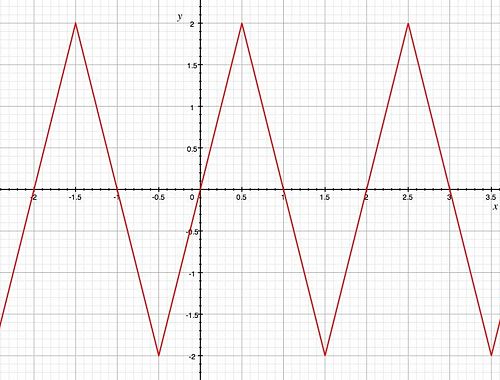Laplace Transform of a Triangle Wave: Difference between revisions
Jump to navigation
Jump to search
Michaelvier (talk | contribs) No edit summary |
Michaelvier (talk | contribs) No edit summary |
||
| Line 3: | Line 3: | ||
This article explains how to transform a periodic function (in this case a triangle wave). This is especially useful for analyzing circuits which contain triangle wave voltage sources. |
This article explains how to transform a periodic function (in this case a triangle wave). This is especially useful for analyzing circuits which contain triangle wave voltage sources. |
||
==Define F(t)== |
|||
<math>m1=\frac{2+2}{.5+.5}=4</math> |
|||
<math>m2=\frac{-2-2}{1.5-.5}=-4</math> |
|||
So, |
|||
<math>F\left( t \right)=\left\{\begin{array}{cc} 4t & -.5\leq t<.5 \\ -4t+4 & .5\leq t<1.5 \end{array}\right |
|||
</math> |
|||
==Author== |
==Author== |
||
Revision as of 18:57, 19 January 2010
Introduction
This article explains how to transform a periodic function (in this case a triangle wave). This is especially useful for analyzing circuits which contain triangle wave voltage sources.
Define F(t)
So,
Failed to parse (SVG with PNG fallback (MathML can be enabled via browser plugin): Invalid response ("Math extension cannot connect to Restbase.") from server "https://wikimedia.org/api/rest_v1/":): {\displaystyle F\left( t \right)=\left\{\begin{array}{cc} 4t & -.5\leq t<.5 \\ -4t+4 & .5\leq t<1.5 \end{array}\right }


